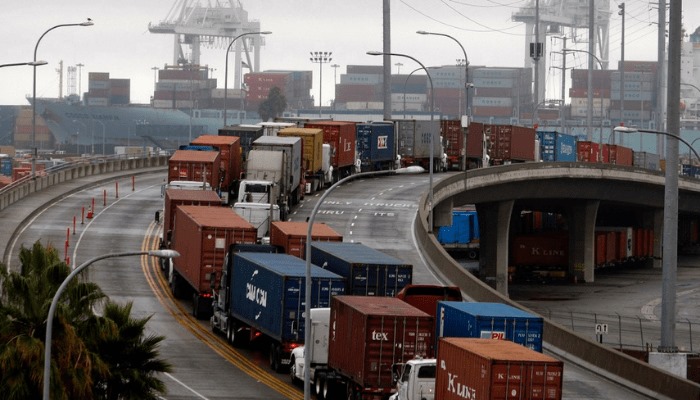Truckers play a crucial role in Nigeria’s supply chain by ensuring the smooth movement of cargo from ports to inland destinations. They are entrepreneurs who seek to make profits while fulfilling an essential service.
However, a troubling practice has emerged among some truckers, jeopardising the efficiency of port operations and the broader supply chain. These truckers, instead of focusing on their assigned tasks, park along Lagos port access roads to solicit additional business. This unwholesome behaviour contributes to traffic congestion, delays cargo movement, and inflates logistics costs, making it imperative for the Nigerian Ports Authority (NPA) and other stakeholders to take decisive action.
The issue of truckers soliciting business on port access roads is largely driven by a desire for extra income.
Many truckers, particularly those driving flatbed trucks, enter the ports empty to pick up containers. Upon exiting, some stop on the roadside to negotiate other business opportunities. Others, already cleared at Truck Transit Parks (TTP) to proceed to the port, linger nearby instead of moving promptly, hoping to secure extra jobs. This behaviour was highlighted during a recent forum, where stakeholders, including importers, exporters, shipping companies, and NPA officials, identified it as a major cause of delays in cargo movement.
Several factors encourage this practice. Chief among them is the greed to maximise earnings by completing dual transactions, such as waiting to pick up an import container after delivering an export one. Low remuneration from employers and the rising cost of fuel further exacerbate the situation. Many truckers are paid meager wages, which forces them to seek additional income to meet personal and professional obligations. Rising fuel prices also create financial strain, especially when truckers exceed their scheduled time on the road and use more fuel than allocated.
The practice of lingering on access roads exposes truckers to a range of hazards. Prolonged idling makes them vulnerable to attacks by thieves and armed robbers who often harm them when they resist. It also leads to irresponsible behaviours, such as excessive drinking and soliciting sex workers as a means of coping with stress. In extreme cases, the pressures of this unstructured work routine even push some truckers into theft.
Poorly maintained port access roads further compound these challenges. Most roads leading to Nigerian ports are dilapidated and intermittently repaired, causing additional delays and creating more opportunities for truckers to park and solicit business.
Inconsistent government policies also play a role in this menace. Sudden policy changes can increase the cost of certain transactions, leaving truckers and their employers to bear the financial burden. Furthermore, the limited functionality of alternative systems for cargo evacuation, such as rail and barges, increases reliance on road haulage, putting greater pressure on truckers and creating an environment conducive to solicitation.
The consequences of this practice are severe and far-reaching. It leads to persistent traffic congestion, which disrupts the schedules of port operations and delays the movement of goods. Importers and exporters bear the brunt of increased logistics costs caused by these delays. This inefficiency not only hampers Nigeria’s port operations but also undermines the country’s economic competitiveness.
To address this growing problem, the Nigerian Ports Authority must enforce existing regulations with greater rigour. Truckers who park illegally on access roads to solicit business should face strict sanctions, and repeat offenders should be dealt with decisively, including the revocation of their operating permits. Lagos State Government should collaborate with the NPA to ensure that offenders are swiftly brought to book. Trucks Transit Parks (TTP), the operators of the electronic truck call-up system known as ETO, should enhance real-time tracking of truck movements and sensitise truckers on the importance of compliance with regulations.
The ETO system, introduced in February 2021, was designed to streamline truck access to the ports by requiring operators to book entry slots in advance. While the system has been helpful, its full potential has yet to be realised. Truck operators must strictly adhere to their allocated time slots, while TTP should invest in better automation to monitor compliance. Employers of truckers can also play a part by ensuring fair remuneration, which would reduce the incentive for drivers to seek additional business on the roads.
Another key step is the improvement of port access infrastructure. The government must prioritise the timely maintenance and rehabilitation of these roads to ensure smooth traffic flow. Better infrastructure would eliminate one of the primary excuses for idling on access roads. Moreover, reviving and expanding alternative means of evacuating goods, such as rail and barges, would ease the over-reliance on road haulage. This would not only reduce congestion but also create a more efficient and balanced system of cargo movement.
Ultimately, it is vital to emphasise the need for behavioural change among truckers themselves. Regular public awareness campaigns should educate them on the dangers of roadside solicitation and the broader consequences for the economy. Truckers should be encouraged to use brokers or automated platforms to secure business opportunities instead of waiting idly on the roads.
The practice of soliciting business on Lagos port access roads is more than a nuisance; it is a major threat to Nigeria’s economic progress. The Nigerian Ports Authority, Lagos State Government, and other stakeholders must work together to enforce stricter regulations, optimise the ETO system, and address the root causes of this issue, such as poor infrastructure and low earnings for truckers. By doing so, they can restore efficiency to port operations and ensure that cargo movement flows seamlessly, as intended.
